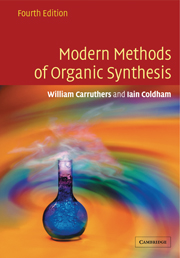Book contents
Preface to the fourth edition
Published online by Cambridge University Press: 05 June 2012
Summary
Some Modern Methods of Organic Synthesis was originally written by Dr W. (Bill) Carruthers, and three popular editions were published that have helped many students of advanced organic chemistry. Unfortunately, Dr Carruthers died in 1990, just prior to his retirement. As his successor at the University of Exeter, it was appropriate that I should take on the task of preparing the fourth edition of this text. In honour of Dr Carruthers, a similar format to previous editions has been taken, although of course the book has been completely re-written and brought up-to-date (through 2003) to take account of the many advances in the subject since the third edition was published. As in previous editions, the text begins with descriptions of some of the most important methods for the formation of carbon–carbon bonds, including the use of enolates and organometallic compounds for carbon–carbon single-bond formation (Chapter 1), methods for carbon–carbon double-bond formation (Chapter 2), pericyclic reactions (Chapter 3), radicals and carbenes (Chapter 4). There has been some re-organization of material and emphasis has been placed on reactions that are useful, high yielding or selective for organic synthesis. For example, Chapter 1 has been expanded to include some of the most popular and contemporary reactions using main-group and transition-metal chemistry (rather than placing reactions of organoboron and silicon compounds into a separate chapter). A new chapter describing the functionalization of alkenes has been devised, covering reactions such as hydroboration, epoxidation and dihydroxylation (Chapter 5).
- Type
- Chapter
- Information
- Modern Methods of Organic Synthesis , pp. xi - xiiPublisher: Cambridge University PressPrint publication year: 2004



